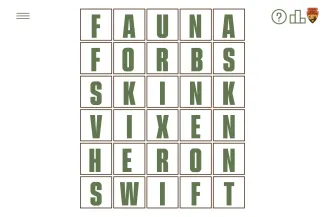
Even when you’re far away from the natural world – sitting behind a desk, scrolling for distraction, or playing a certain online word game to make it through the rest of your day – you can still immerse yourself in the plants and animals that help make Oklahoma incredible. We’ve combed through our lexicon of wild conservation terms to find five-letter words that can keep you connected between your nature fixes … and might just fit in your next Wordle puzzle.
WORDLE: FAUNA (and FLORA too!)
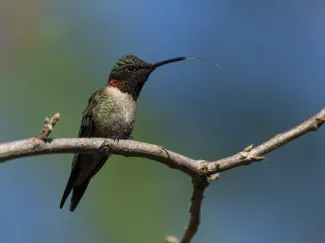
Ruby-throated hummingbird.
noun [FAW] + [NUH]: animal life, especially the animals characteristic of a region, period, or special environment. Merriam-Webster.com Dictionary.
The Wildlife Department has long been charged with managing and protecting fish and wildlife, along with their habitats. This mission embraces thousands of species of both fauna and flora, including 450-plus birds, 100-plus mammals, 150-plus fish, 125-plus reptiles and amphibians, and 2,500-plus plants.
In addition to Oklahoma’s familiar game animals, the Wildlife Department is also focused on the 300-plus species identified as being in greatest need of additional conservation attention, including the Texas horned lizard, crawfish frog, and Ozark big-eared bat. The agency’s Wildlife Diversity Program has partnered with research groups to learn more about these species and the habitats on which they rely.
Stay in touch with the Wildlife Department and learn about its conservation work by following us on our social media channels, @okwildlifedept.
WORDLE: FORBS
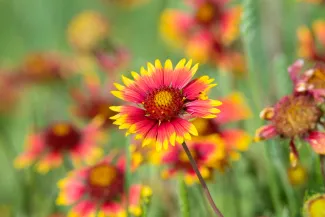
Indian blanket.
noun [PH] + [ORBS]: an herb other than grass. Merriam-Webster.com Dictionary.
Whether you call them forbs, flowers, or weeds, many wildlife simply call this suite of seed-producing plants “food.” Forbs (and their seeds, leaves, and pollen) are a critical source of food for pollinators and songbirds alike. When growing thick or tall enough, they can also provide escape and thermal cover for even more amazing animal life.
Adding forbs and other native plants to your backyard or pasture is a great way to attract wildlife to your property. We share tips for establishing a successful wildscape in our free Landscaping for Wildlife guide.
WORDLE: SKINK
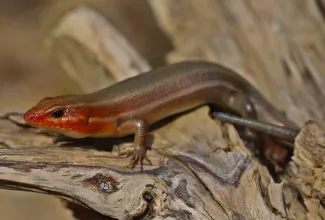
Broad-headed skink.
noun [SKINK]: any of a family (Scincidae) of typically small insectivorous lizards with long tapering bodies. Merriam-Webster.com Dictionary.
Oklahoma’s wildlife often comes with wild stories! When faced down by a potential predator, a group of lizards known as skinks may rely on a drastic survival tactic – voluntary tail amputation. To create a distraction and open an escape route, the lizard can separate its tail from the body at distinct planes within the vertebrae and muscles. The tail can eventually be regrown, but the stunt comes with costs. The lizard loses important fat reserves and may be more vulnerable to another predation attempt.
Learn more about Oklahoma’s incredible lizards in “A Field Guide to Oklahoma’s Amphibians and Reptiles,” available in our Go Outdoors Oklahoma shop.
WORDLE: VIXEN
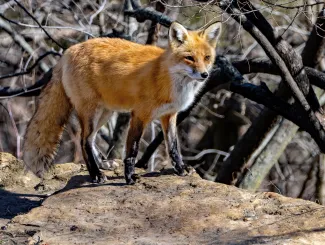
noun [VIK] + [SUHN]: a female fox. Merriam-Webster.com Dictionary.
Wildlife are often known by multiple names. A group of red fox, formally known as Vulpes vulpes, may be called an earth, leash, or skulk, while the pups are often called kits, adult males are called dogs, and females are known as vixens.
Whatever you chose to call them, foxes and other wildlife spotted in Outdoor Oklahoma can make for great memories, and great television! Check out this clip of red fox fisticuffs, then follow the Wildlife Department’s Outdoor Oklahoma YouTube channel for more wild videos!
WORDLE: HERON
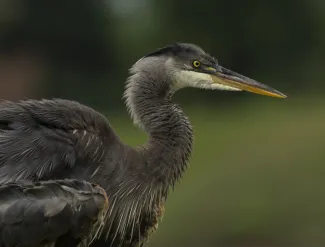
noun [HERR] + [UHN]: any of various long-necked and long-legged wading birds (family Ardeidae) with a long tapering bill, large wings, and soft plumage. Merriam-Webster.com Dictionary.
Herons can be a great introduction to the world of bird watching. As a group, Oklahoma’s four herons are large enough to readily be seen and have a distinctive body shape with a long neck and legs. And the great blue heron, the largest of the wading birds, can be found across Oklahoma year-round.
Bird watching can be a great reason to explore Oklahoma and its natural places. In addition to helping you disconnect from your daily stresses – or reconnect with your wild family and friends – your bird watching excursions can also help biologists! When you share your sightings of birds or other animals or plants, you’re filling in gaps of knowledge and contributing to conservation!
WORDLE: SWIFT
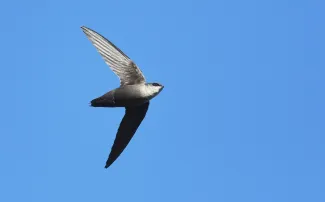
adjective [SWIFT]: moving or capable of moving with great speed.
noun: 1 any of several lizards (especially of the genus Sceloporus) that run swiftly, 3: any of numerous small plainly colored birds (family Apodidae) that are related to the hummingbirds but superficially much resemble swallows. Merriam-Webster.com Dictionary.
From chimney swifts to swift foxes, Oklahoma has no shortage of speedy animals. But speed isn’t the only adaptation of our state’s fish and wildlife. Camouflage, migration, special foraging behaviors, and mimicry are just a few ways animals have found their niche!
Meet Oklahoma’s incredible wildlife species each month in the free Wild Side e-newsletter! In addition to species spotlights, each issue shares updates on research and survey projects and ways to get involved in conservation.
Even More Wild Words!
ANOLE | LARKS | SHREW |
BIRDS | LARVA | SHRUB |
BRIAR | MOUSE | SIREN |
BROOD | PIPIT | SLIMY |
CREEK | PLANT | SNAKE |
EAGLE | RACER | SPADE |
EGRET | ROBIN | STILT |
FINCH | SCALE | TERNS |
FROGS | SCUTE | VIREO |
GREBE | SHELL | WARTS |